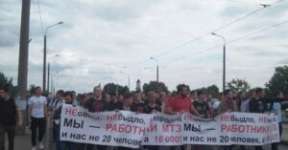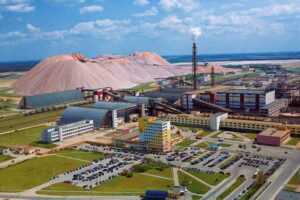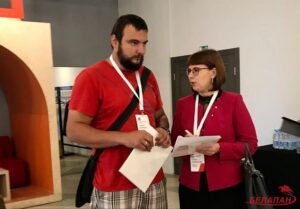Can strikes lead to peaceful political change in Belarus?
Siarhei Bohdan, Belaru Diigest
1 September 2020, 17:55
 Speaking at a conference on 28 August, Belarusian President Alexander Lukashenka announced that he was willing to enter into dialogue with “working and student collectives” on political issues, including to prepare a new constitution. While he has a poor record of negotiations with his political opponents and it is difficult to believe the sincerity of his invitations, this time it sounds different.
Speaking at a conference on 28 August, Belarusian President Alexander Lukashenka announced that he was willing to enter into dialogue with “working and student collectives” on political issues, including to prepare a new constitution. While he has a poor record of negotiations with his political opponents and it is difficult to believe the sincerity of his invitations, this time it sounds different.
After all, since 14 August, workers at dozens of state-owned enterprises in Belarus have gone on full-scale or partial strikes, staged rallies and published collective protest statements. This wave of activism has become a game-changer, prompting the authorities to resort to repression against labour activists but also to take a more cautious line on street protests.
The last time Belarusian workers protested was in the mid-1990s, and these were only limited strikes in the capital Minsk. No prominent commentators of Belarusian politics expected workers to create trouble for Lukashenka after the contested 9 August presidential election.
Indeed, in the first days following the 9 August election, everything proceeded as usual in the country in terms of workers. However, a significant confrontation between law enforcement and protesters emerged: during the first four days of protests against the rigged election, security agencies detained over 6,700 people. Despite more violence and even deaths taking place than in previous cases, it was a familiar scenario of a post-election crackdown in Belarus. Yet on 12 August news appeared about workers at state-owned enterprises going on strike. The authorities dismissed these reports as rumours, even as more evidence started to emerge.
Finally, on 14 August, leading Belarusian state firm— potash fertiliser producer Belaruskali—published on its website an unprecedented letter by its personnel demanding the authorities “to immediately stop the violence by security agencies. We also ask peaceful protesters to stay peaceful.” In addition, a number of workers were reported to be trying to launch a strike. Lukashenka could not ignore this because Belaruskali is among the biggest sources of foreign-currency for Minsk. Last year, it exported fertilisers worth USD 2.77bn.
![Can strikes lead to peaceful political change in Belarus?]()
Alongside Belaruskali, many other big state-owned firms concurrently faced labour unrest. Among them were BelAZ, MAZ, MTZ, MZKT and Naftan—in Minsk and in all regions. In most cases, strikes remained partial and very short, However, even lesser protests produced some results. At truck manufacturer MAZ (employing more than 15,500 personnel) in Minsk, usually silent trade unions on 13 August issued a public letter demanding, on behalf of MAZ employees, a halt to violence by security agencies. The following day more than one thousand MAZ workers rallied at the entrance to the factory and discussed with the director not only election falsifications and post-election violence but also labour and social rights and guarantees reduced during Lukashenka’s time. Despite news of protests and attempts to launch a fully-fledged strike at MAZ over the next few days, the factory avoided it.
An even more remarkable case took place at MZKT—a commercially successful defence industries company in Minsk with over 5,000 employees. Its similarly usually silent trade unions on 11 August sent a delegation to management to discuss the violence during the protests. It received no answers. On 14 August, workers of the factory held a rally, forcing director Alexei Rymasheuski to publicly announce that Lukashenka had not won the election. On 17 August, Lukashenka himself came to MZKT and addressed a crowd which openly defied him and demanded his resignation.
The most remarkable thing about the protesting workers has been that they have expressed anger primarily at the rigged election and the actions of security agencies, having shown limited support for opposition candidate Sviatlana Tsikhanouskaya. Indeed, neither opposition candidates nor Lukashenka paid much attention to this demographic during the election campaign. However, by unleashing police and other law enforcement organisations and tolerating their unprofessional and violent treatment of the protesters, the government shot itself in the foot.
Meanwhile, the industrial workforce harbours huge protest potential untapped in the election. Lukashenka pledged to continue his current policies, and they include the silent and consistent reduction of social guarantees and dismantling of whole enterprises. Belarusian cities and towns are already full of former industrial buildings which are either abandoned or transformed into shopping centres. In 1999, the Belarusian president introduced the contract employment system, which made it possible to employ workers for a limited time span and intimidate them with the threat of dismissal.
Lukashenka’s competitors in this election offered no alternative for workers, either. Everyday social problems, the deficit of decent employment and de-industrialisation, which affect a large part of the Belarusian population, have remained completely out of focus in the ongoing Belarusian political confrontation.
Hence, it was a challenge for the opposition after the election to accommodate unexpected allies—industrial workers. The leadership of the opposition’s Coordination Council was established on 18 August, and was made up of a number of prominent intellectuals; only the next day did it co-opt a single representative from the striking committees, Siarhei Dyleuski from the huge MTZ factory in Minsk. Despite the workers’ intervention into the confrontation with Lukashenka in the form not only of strikes but also an impressive workers march from their MTZ tractor factory to the centre of Minsk on 17 August, the leaders of the protests have so far failed to raise the issues which for workers are the most pressing ones.
Simultaneous strikes at all state-owned enterprises on their own will not ensure the collapse of the regime. Industry accounts for more than a quarter of Belarusian GDP, but Lukashenka’s tacit demolition of state-owned enterprises and his policy of allowing private entrepreneurs to establish alternative production lines has changed the balance in the economy since Soviet times. Last year, state-owned firms produced only 13.4% of industrial output and employed 19% of the industrial workforce. So, in the short-term perspective, Lukashenka can survive even a nationwide strike. However, over the longer term it is impossible to run the country if strikes continue. No wonder that on 22 August the Belarusian president threatened to invite the unemployed “from the street” or bring in unemployed Ukrainian miners to replace striking workers.
![]()
It remains unclear how many strikes have actually taken place. Belarusian officials deny that any occurred at all and issue sometimes extremely contradictory statements. On 18 August Prime Minister Halouchanka announced that although no strikes had taken place, “some groups of protesters” were to be found in some firms, and production had halted in “some parts” of some enterprises, specifically mentioning Belaruskali and Hrodnazot. This had no consequences for the economy, insisted Halouchanka.
Halouchanka contradicted himself a minute later by complaining about Belaruskali’s losses when he said that “some workers for a while could not decide whether they were going to go to their places of work or to the square, and this caused a certain decrease in volumes of production. Our competitors immediately took advantage of this, specifically [Russian potash fertiliser producer] Uralkali”.
However, in the past week workers‘ activity has diminished again. Opposition media has reported some strikes, for example by a small number of mineworkers at Belaruskali and a possible slowdown at others. But TUT.by opposition media outlet for example on 27 August conceded that “protest activity” at Belaruskali had diminished because “the authorities pressure brought results.”
The Belarusian security services have indeed detained some activist workers, not only at Belaruskali but at many other involved firms. Dyleuski has been incarcerated, and Yury Ravavy, chair of the striking committee at the major Hrodna Azot chemical plant, fled to Poland. But that is only part of the explanation. Another unpleasant fact for the opponents of the government concerns their continuing neglect of workers’ concerns and their unwillingness to provide more than a symbolic representation to the workers.
{bannew_news_show}
The developments around labour action look like one of the few pieces of good news in recent weeks. The workers have managed to force the government to consider dialogue within the country. Dialogue among Belarusians can better preserve the Belarusian state and develop the country in a democratic way than any formal or informal agreements between foreign politicians, including Russian President Vladimir Putin. Moreover, the workers’ movement has a powerful instrument to make the government enter the dialogue and follow any eventual agreement: labour action.
1 September 2020, 17:55

After all, since 14 August, workers at dozens of state-owned enterprises in Belarus have gone on full-scale or partial strikes, staged rallies and published collective protest statements. This wave of activism has become a game-changer, prompting the authorities to resort to repression against labour activists but also to take a more cautious line on street protests.
Workers’ protests: a black swan of Belarusian politics
The last time Belarusian workers protested was in the mid-1990s, and these were only limited strikes in the capital Minsk. No prominent commentators of Belarusian politics expected workers to create trouble for Lukashenka after the contested 9 August presidential election.
Indeed, in the first days following the 9 August election, everything proceeded as usual in the country in terms of workers. However, a significant confrontation between law enforcement and protesters emerged: during the first four days of protests against the rigged election, security agencies detained over 6,700 people. Despite more violence and even deaths taking place than in previous cases, it was a familiar scenario of a post-election crackdown in Belarus. Yet on 12 August news appeared about workers at state-owned enterprises going on strike. The authorities dismissed these reports as rumours, even as more evidence started to emerge.
Finally, on 14 August, leading Belarusian state firm— potash fertiliser producer Belaruskali—published on its website an unprecedented letter by its personnel demanding the authorities “to immediately stop the violence by security agencies. We also ask peaceful protesters to stay peaceful.” In addition, a number of workers were reported to be trying to launch a strike. Lukashenka could not ignore this because Belaruskali is among the biggest sources of foreign-currency for Minsk. Last year, it exported fertilisers worth USD 2.77bn.

Production facilities of Belaruskali. Image: slutsk-gorod.by
A self-made catastrophe for Lukashenka…
Alongside Belaruskali, many other big state-owned firms concurrently faced labour unrest. Among them were BelAZ, MAZ, MTZ, MZKT and Naftan—in Minsk and in all regions. In most cases, strikes remained partial and very short, However, even lesser protests produced some results. At truck manufacturer MAZ (employing more than 15,500 personnel) in Minsk, usually silent trade unions on 13 August issued a public letter demanding, on behalf of MAZ employees, a halt to violence by security agencies. The following day more than one thousand MAZ workers rallied at the entrance to the factory and discussed with the director not only election falsifications and post-election violence but also labour and social rights and guarantees reduced during Lukashenka’s time. Despite news of protests and attempts to launch a fully-fledged strike at MAZ over the next few days, the factory avoided it.
An even more remarkable case took place at MZKT—a commercially successful defence industries company in Minsk with over 5,000 employees. Its similarly usually silent trade unions on 11 August sent a delegation to management to discuss the violence during the protests. It received no answers. On 14 August, workers of the factory held a rally, forcing director Alexei Rymasheuski to publicly announce that Lukashenka had not won the election. On 17 August, Lukashenka himself came to MZKT and addressed a crowd which openly defied him and demanded his resignation.
The most remarkable thing about the protesting workers has been that they have expressed anger primarily at the rigged election and the actions of security agencies, having shown limited support for opposition candidate Sviatlana Tsikhanouskaya. Indeed, neither opposition candidates nor Lukashenka paid much attention to this demographic during the election campaign. However, by unleashing police and other law enforcement organisations and tolerating their unprofessional and violent treatment of the protesters, the government shot itself in the foot.
Meanwhile, the industrial workforce harbours huge protest potential untapped in the election. Lukashenka pledged to continue his current policies, and they include the silent and consistent reduction of social guarantees and dismantling of whole enterprises. Belarusian cities and towns are already full of former industrial buildings which are either abandoned or transformed into shopping centres. In 1999, the Belarusian president introduced the contract employment system, which made it possible to employ workers for a limited time span and intimidate them with the threat of dismissal.
… and a challenge for the opposition?
Lukashenka’s competitors in this election offered no alternative for workers, either. Everyday social problems, the deficit of decent employment and de-industrialisation, which affect a large part of the Belarusian population, have remained completely out of focus in the ongoing Belarusian political confrontation.
Hence, it was a challenge for the opposition after the election to accommodate unexpected allies—industrial workers. The leadership of the opposition’s Coordination Council was established on 18 August, and was made up of a number of prominent intellectuals; only the next day did it co-opt a single representative from the striking committees, Siarhei Dyleuski from the huge MTZ factory in Minsk. Despite the workers’ intervention into the confrontation with Lukashenka in the form not only of strikes but also an impressive workers march from their MTZ tractor factory to the centre of Minsk on 17 August, the leaders of the protests have so far failed to raise the issues which for workers are the most pressing ones.
Simultaneous strikes at all state-owned enterprises on their own will not ensure the collapse of the regime. Industry accounts for more than a quarter of Belarusian GDP, but Lukashenka’s tacit demolition of state-owned enterprises and his policy of allowing private entrepreneurs to establish alternative production lines has changed the balance in the economy since Soviet times. Last year, state-owned firms produced only 13.4% of industrial output and employed 19% of the industrial workforce. So, in the short-term perspective, Lukashenka can survive even a nationwide strike. However, over the longer term it is impossible to run the country if strikes continue. No wonder that on 22 August the Belarusian president threatened to invite the unemployed “from the street” or bring in unemployed Ukrainian miners to replace striking workers.

Siarhei Dyleuski and Volha Kavalkova. Image: Belapan.
It remains unclear how many strikes have actually taken place. Belarusian officials deny that any occurred at all and issue sometimes extremely contradictory statements. On 18 August Prime Minister Halouchanka announced that although no strikes had taken place, “some groups of protesters” were to be found in some firms, and production had halted in “some parts” of some enterprises, specifically mentioning Belaruskali and Hrodnazot. This had no consequences for the economy, insisted Halouchanka.
Halouchanka contradicted himself a minute later by complaining about Belaruskali’s losses when he said that “some workers for a while could not decide whether they were going to go to their places of work or to the square, and this caused a certain decrease in volumes of production. Our competitors immediately took advantage of this, specifically [Russian potash fertiliser producer] Uralkali”.
However, in the past week workers‘ activity has diminished again. Opposition media has reported some strikes, for example by a small number of mineworkers at Belaruskali and a possible slowdown at others. But TUT.by opposition media outlet for example on 27 August conceded that “protest activity” at Belaruskali had diminished because “the authorities pressure brought results.”
The Belarusian security services have indeed detained some activist workers, not only at Belaruskali but at many other involved firms. Dyleuski has been incarcerated, and Yury Ravavy, chair of the striking committee at the major Hrodna Azot chemical plant, fled to Poland. But that is only part of the explanation. Another unpleasant fact for the opponents of the government concerns their continuing neglect of workers’ concerns and their unwillingness to provide more than a symbolic representation to the workers.
{bannew_news_show}
The developments around labour action look like one of the few pieces of good news in recent weeks. The workers have managed to force the government to consider dialogue within the country. Dialogue among Belarusians can better preserve the Belarusian state and develop the country in a democratic way than any formal or informal agreements between foreign politicians, including Russian President Vladimir Putin. Moreover, the workers’ movement has a powerful instrument to make the government enter the dialogue and follow any eventual agreement: labour action.

